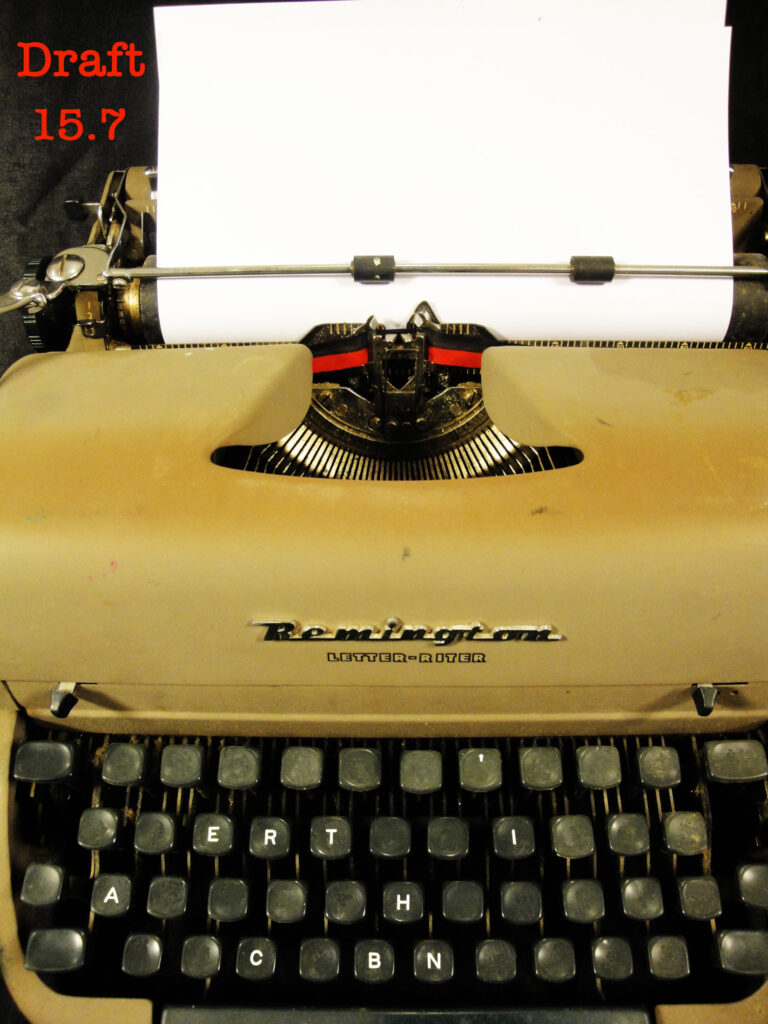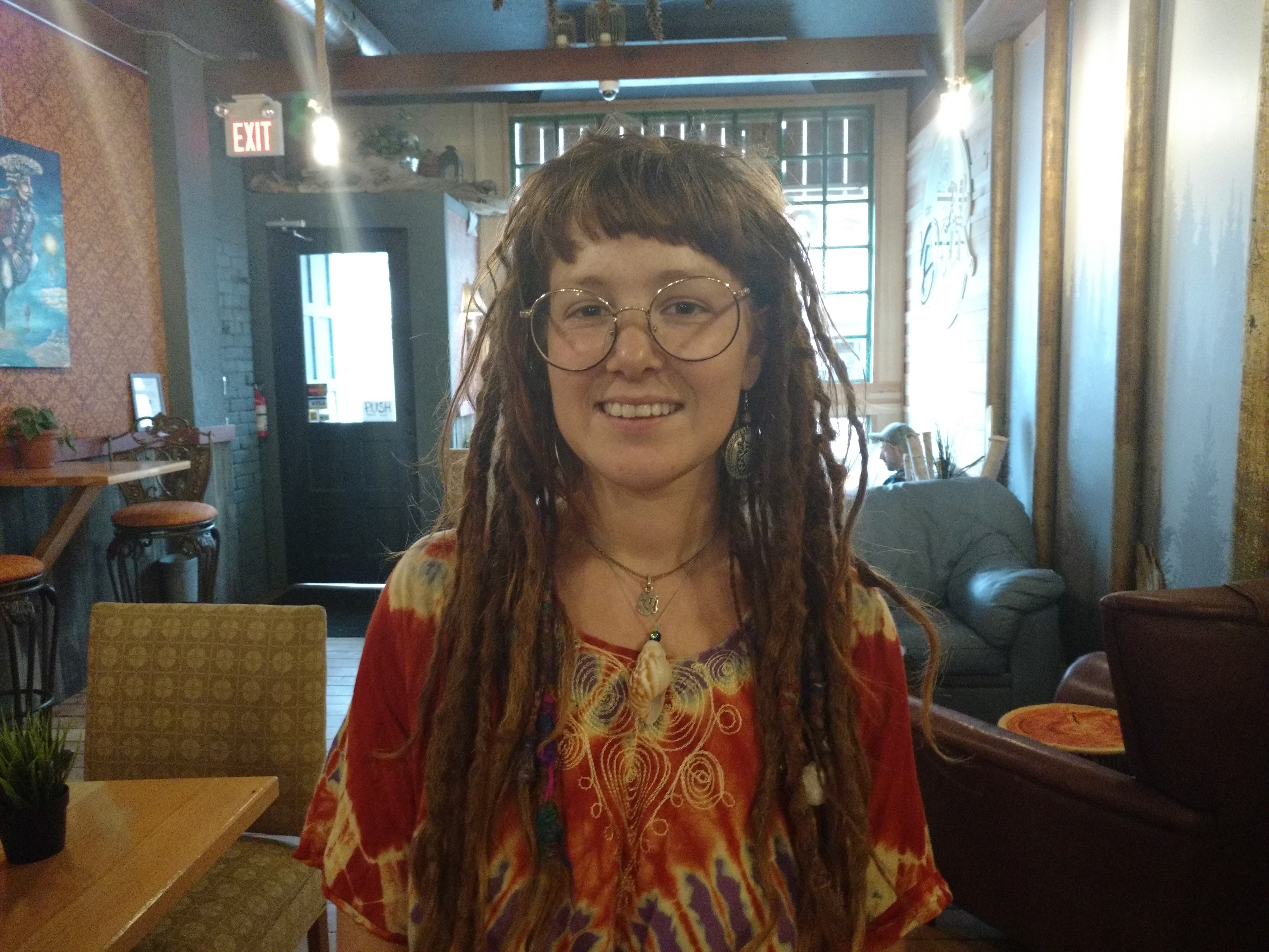Draft 16.5 May 30th
Please join us on Sunday, May 30, to hear new work by Sonja Boon, Kern Carter, Ellen Chang-Richardson, Mark Laliberte, Sanna Wani and Andrew Wilmot.
TIME:
Sunday, May 30, 3:00 p.m.
Please register on eventbrite:
https://www.eventbrite.ca/e/draft-165-tickets-153062013603
Tickets are available in a range of prices (including free). The proceeds will go directly to authors at this and future readings in the series.
The reading will take place on ZOOM.
The link will appear on your ticket and on the email you’ll receive ten minutes before the reading.
Closed-captioning will be available. Please feel free to contact us with your access needs and questions: draftreadings at gmail.com
Here is some more information on the authors:
Sonja Boon is a researcher, writer, teacher, and flutist living in St. John’s. Passionate about stories and storytelling, she is the author of What the Oceans Remember: Searching for Belonging and Home (WLU Press, 2019), a memoir that traverses five continents and spans more than two centuries. Sonja’s creative non-fiction essays appear in published collections as well as in Geist, The Ethnic Aisle, and ROOM, among others. For six years, Sonja was principal flutist and a frequent soloist with the Portland Baroque Orchestra (Oregon).
Kern Carter is a writer and author who has written and published two novels — Thoughts of a Fractured Soul and Beauty Scars. Kern is also a ghostwriter with credits in Forbes, The New York Times, Global Citizen and Fatherly.com, along with having ghostwritten several books. When he’s not penning novels or ghostwriting, Kern creates and curates stories through CRY Creative Group, his content creation brand that specializes in written storytelling.
Ellen Chang-Richardson (she/her) is an award-winning poet, writer and editor of Taiwanese and Cambodian-Chinese descent. The author of three poetry chapbooks, including snap, pop, performance (Gap Riot Press), her writing has appeared in The Fiddlehead, untethered magazine, Watch Your Head: Writers & Artists Respond to the Climate Crisis (Coach House Books), among others. She is the founder of Little Birds Poetry, the co-founder of Riverbed Reading Series, and a member of the poetry collective VII. She currently lives/works on the traditional unceded territory of the Algonquin Anishinaabeg.
Mark Laliberte is an artist-writer-designer with an MFA from University of Guelph. He has exhibited extensively in galleries across Canada and internationally, curates the online experimental comics site http://4panel.ca, and edits the hybrid art/lit mag CAROUSEL. Laliberte has had pageworks, poems and other print experiments appear in publications big and small, including Ink Brick, POETRY, prairie fire, subTerrain and Vallum. Publications include ‘BRICKBRICKBRICK‘ (Book*Hug, 2010) and ‘asemanticasymmetry‘ (Anstruther Press, 2016). He is the recipient of numerous grants, including a Canada Council for the Arts ‘Digital Originals’ grant. Laliberte is a member of the collaborative writing entity, MA|DE.
Sanna Wani lives between Mississauga and Srinagar. Her poems have been published in Poem-A-Day, Arc Poetry Magazine, and Best Canadian Poetry 2020. She loves daisies.
Andrew Wilmot is an award-winning Toronto-based author and editor, and co-publisher of the magazine Anathema: Spec from the Margins. Their fiction has appeared in a variety of places, both online and in print. Further details at andrewwilmot.ca. Their first novel, The Death Scene Artist, is available from Wolsak & Wynn/Buckrider Books.
We are grateful for the financial assistance of the Canada Council for the Arts through the Writers’ Union of Canada, and the Canada Council for the Arts and the Department of Canadian Heritage through the League of Canadian Poets.
Draft 16.4 April 18th
Please join us on Sunday, April 18 for a chance to hear new and unpublished work by Farzana Doctor, Kamila Rina, Leanne Toshiko Simpson and Christine Tran.
TIME:
Sunday, April 18, 3:00 p.m.
The reading will take place on ZOOM.
Closed-captioning will be available.
Please register on eventbrite and refer to your ticket for the link.
https://www.eventbrite.ca/e/draft-164-tickets-148650759423
Tickets are available on a sliding scale (including free). Proceeds go to pay authors at this and other readings in the season.
This reading is part of National Poetry Month, sponsored by the League of Canadian Poets. This year’s theme is RESILIENCE. You can read more about the authors below.
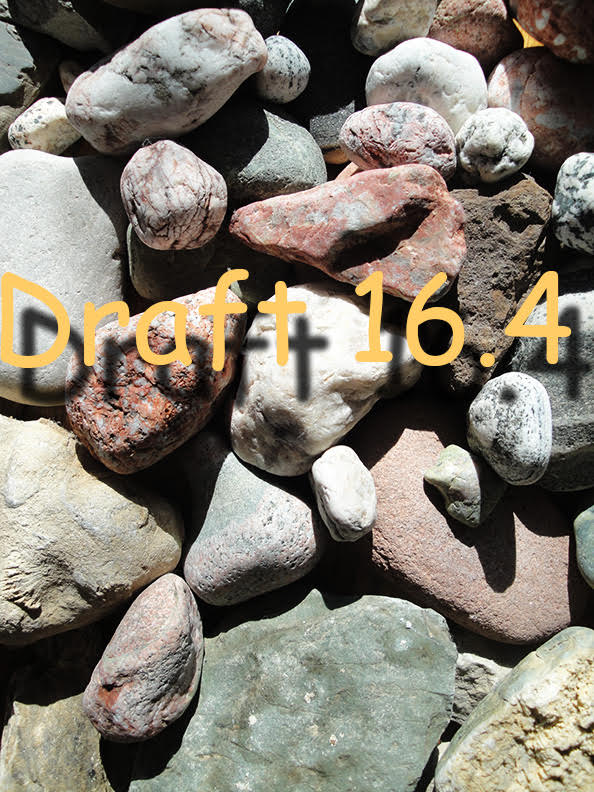
Farzana Doctor is the author of Stealing Nasreen, All Inclusive, and Six Metres of Pavement, which won the 2012 Lambda Literary Award and was shortlisted for the Toronto Book Award. Farzana is one of CBC Books Ten Canadian Women Writers You Need to Read Now and the recipient of the Writers Trust of Canada’s Dayne Ogilvie Grant. Her latest book, Seven, was published by Dundurn in 2020. She lives in Toronto.
Kamila Rina is a multi-disabled immigrant Jewish non-binary bi poet, and a sexuality, gender, and disability educator. They have been published internationally, including in Room Magazine, Breath and Shadow, Monstering, Deaf Poets Society, Carousel, Augur, Frond, Mary, and Queer Out There. Their favourite things include trees, books, vegan gluten-free blueberry pie, and radical accessibility. Find them at KamilaRina.com.
Leanne Toshiko Simpson is a Yonsei writer from Scarborough living with bipolar disorder. She is a graduate of UTSC Creative Writing and the University of Guelph’s MFA, and is currently completing an EdD in Social Justice Education at the University of Toronto. She was named Scarborough’s Emerging Writer of 2016 and was nominated for the Journey Prize in 2019. She currently teaches creative writing at the Centre for Addiction and Mental Health (CAMH) and InkWell Workshops. Her debut novel, Infinite Snails, will be published in 2022 by HarperCollins.
Christine H. Tran is part writer, part scholar, part gamer, and all female nephew. Among other places, their work has been featured in untethered, Half a Grapefruit, The Temz Review, alt.theatre, and FEEL WAYS. They are a PhD student at UofT’s Faculty of Information and a Junior Fellow at Massey College. Christine targets their tweets for nine specific people at @thechristinet.
Here’s the description put out by the League of Canadian Poets for its National Poetry Month theme.
What does it mean to be resilient? We meet resilience in every corner we’ve been backed into, every hardship that we endure. Resilience is geographical, spiritual, historical. It’s the fight against climate change, the inner battle with mental health, the outcry for human rights and an end to systemic racism. Resilience is the backbone of generations of trauma, the silence at the dinner table, the bow to culture’s violin. Resilience is the courage to start each day anew. This NPM 2021, we celebrate, reflect on and respect the resilience that has made us who we are.
We are grateful for the financial assistance of the Canada Council for the Arts through the Writers’ Union of Canada, and the Canada Council for the Arts and the Department of Canadian Heritage through the League of Canadian Poets.

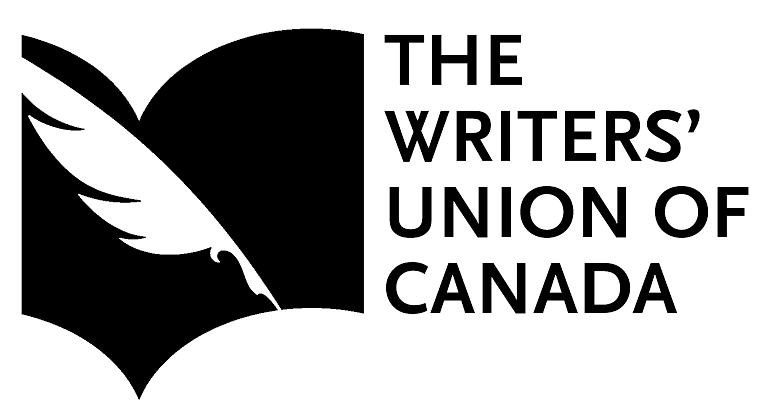

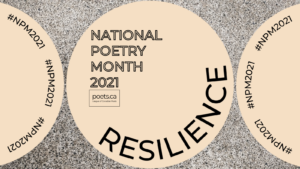
Draft 16.3 March 21 2021
Please stay tuned for another fabulous edition of Draft
March 21, 2021
3:00 p.m. on ZOOM
Hosted by Kern Carter
and featuring readings by contributors to CRY Magazine and members of The Nia Centre.
Tickets are on a sliding scale, and all the money goes to the authors.
You can learn about some of this afternoon’s contributors below — and stay tuned for more to come!
Authors from CRY
Carlos Anthony: I write stories and share experiences that black men are afraid to write about and are ashamed to talk about. I open the discussion of the vulnerability we face as men but hide because of the stereotypes associated with that vulnerability. Here’s a link to Carlos’s work on CRY.
Aisha Gallion is a Columbia, South Carolina native and music enthusiast/researcher. As a writer, she holds expertise in Black music studies in the U.S. and poetry. Much of what she pursues aims to uplift and highlight the contributions of Black folks in the arts. When she isn’t writing she’s watching tiny house tours and listening to chloexhalle. Here’s a link to Aisha’s work on CRY.
A Dominican immigrant to the US, Johanny (Joa) Ortega always wanted to write but made a detour through the Army, and motherhood and is now finding her way back to her first love. Currently pursuing an MFA on creative writing through National University in California, and two WIPs, one a speculative fiction/gothic, the other a contemporary fiction. Constantly forages her schedule for free minutes to write. Here’s a link to Joa’s work on CRY.
Authors from the NIA Centre
Helen Akey is an upcoming poet and creative writer. She is a third-year student at York University, studying Culture and Expression. As a young girl, she would journal everything that was happening in her life as a form of therapy. In grade 12, spoken word artist and activist, Faduma Mohamed, introduced her to poetry and different performance styles to further express physical, mental and emotional journeys. As she continuously gains exposure and guidance from others in the field of creative writing, she would like to share her knowledge, skills, and stories to future generations to inspire and encourage them, to use their voice to speak their truth as they navigate in their journey of life⎼⎼openly.
Rachel Barduhn is a freeverse poet and aspiring writer from Scarborough who aims to weave magic, imagination, truth and diversity into her work. As someone who faced many difficulties growing up with mental illness, she also uses her poetry to inspire and normalize complicated emotions/feelings. With her story writing, Rachel aims to create diverse characters in a positive light to show the world as it is, a place full of diverse cultures and racial backgrounds. Showing that people of colour can be included in fiction and fantasy. She has a lot to say and has decided from when she was 12 she wasn’t going to write what others wanted of her but that it starts with her in the messages she wants to bring forth.
Darynel Beckford is 24 year old, QUEERibbean Culture Writer and Digital Creator. Jamaican by birth, but global citizen by existence, he spends most of his time reflecting on things that are wrong within society and advocating for making them right. His favourite stories bring to the forefront the stories of Caribbean people, beyond the lens of the biased first world, and emphasize the true lived experiences of same. He is open to connecting with kinfolk and looks forward to interacting with you all.
Tamara Jones is a freelance culture writer and performing artist based in Tkaronto. By day, they work as a publicist and digital content creator for theatre companies, festivals, and film productions including The Theatre Centre, SummerWorks, the South Western International Film Festival, Neon, Warner Bros., and Switch Hitter Films. Their written and spoken work has been featured in and commissioned by a handful of publications including Ephemera Magazine, Adolescent Content, Lithium Magazine, Feels Zine, With/out Pretend, and The Globe and Mail. ‘Viaduct’ is their first work of fiction.
Omi is a young black writer dually located in Kitchener-Waterloo and Toronto making sense of time and space. Their writing is concerned with the Black diasporic experience of spirituality, love and dance. While completing their undergrad, they are active in organizing spaces between KW and Toronto, working to make Black communities more livable.
Muna (Warda) Youssouf is a poet and a visual artist living in Toronto. Born in Djibouti and raised in the UK, Muna is a Self-taught Artist. She was the recipient of the David Maltby Award in 2019 for her exhibition Roots, and of a Toronto Refugee Mentorship Grant, to help develop her first feature film, People from Nowhere in (2019). Her practice is engaged with themes of home, change and displacement. Muna engages her local and artistic community through production and curation of story-telling shows and art therapy events at venues across Toronto like Hashtag Gallery. Where she recently curated Roots, a group exhibition interpreting the idea of ‘roots’ through different mediums. She has exhibited at Gallery 44 (2019), Hashtag Gallery (2018-2020), Ryerson Image Center (2019) and Day’s and Atkinson’s Almhouse Photography Competition (2013) where she placed third for her depiction of the ever-changing housing hardships in London, UK. In under 2 years in the film industry, she has produced 3 shorts Confessions(2020), Emancipation of Egbert(2019) Menagerie (2019) and with over 10 credits in commercial productions as a PA, AD and art department. Nowadays, you can find her working on her short Tahira, as well as her documentary “The Power of Names”.
MORE ABOUT KERN CARTER:
Kern Carter is a full-time freelance writer and author who has written and self-published two novels — Thoughts of a Fractured Soul (novella) and Beauty Scars. A young adult novel, Boys and Girls Screaming is forthcoming from DCB publishing. Kern is also a ghostwriter with credits in Forbes, the New York Times, Global Citizen, Elle Magazine and Fatherly.com, along with having ghostwritten several books. When he’s not penning novels or ghostwriting, Kern is curating stories through CRY, his online publication that discusses the emotional aspects of being a writer or any other type of artist. He lives in downtown Toronto with his 18-year-old daughter and they get along admirably. (Kern will also be hosting and curating.)
MORE ABOUT CRY:
Our mission at CRY is simple: to build a community of emerging creatives who are connected by the power of vulnerability and creativity. We emphasize the emotional aspects of the creative process and help creatives navigate emotions with educational content, community events, as well as articles for artists expressing the joy and frustration that comes with being a creator.
MORE ABOUT NIA CENTRE FOR THE ARTS:
We are a Toronto-based not-for-profit organization that supports, showcases and promotes an appreciation of arts from across the African Diaspora.
Draft 15.7 … zooming on August 23
We’re proud to announce our upcoming summer virtual edition of the Draft reading series hosted by Gloria Blizzard.
Sunday, August 23, 2020
3:00 p.m
Along with Gloria, we are featuring 10 other readers presenting their newest work.
- Gloria Blizzard is a non-fiction writer, poet and penner of songs, whose essays, reviews and articles have appeared in numerous literary publications, magazines and sound recordings. Her work can be found at gloriablizzard.com.
- Maheen Hyder is a Pakistani poet and mental health therapist whose work focuses on cityscapes and memory as they relate to migration and has been published in Arc Poetry Magazine, The Postcolonialist, The Puritan, The Fiddlehead and Bosphorus Review of Books.
- Bänoo Zan is a poet and poetry organizer with three books and over 200 individual poems and poetry related pieces in online and print publications around the globe. Her work can be found on Amazon.
-
Aaron Schneider is the author of the novella Grass-Fed and a founding editor at The Temz Review. His work can be purchased at Quattro books.
-
Eufemia Fantetti teaches English at Humber College and co-edits the Humber Literary Review. Her books can be found on bookshelves of both independent and major bookstores.
-
Therese Estacion immigrated to Canada when she was ten from Cebu, Philiipines. She is an elementary school educator, poet, and identify as having a disability/disabled—since 2016— due to bilateral below knee and hand amputations as a result of sepsis. Her upcoming work will be coming from Book*Hug in the spring of 2021.
- Anuja Varghese is a Pushcart-nominated writer based in Hamilton whose work has been featured in many literary magazines and journals, and who is currently at work on a debut collection of short stories. A list of her publications can be found on anujavarghese.com.
-
Sonja Boon is a researcher, writer, teacher, and flutist living in St John’s. Her book can be found at WLU press.
- Rita Shelton Deverell is a theatre and media artist whose play “Who You Callin Black Eh?” won the 2019 Toronto Fringe Festival’s Teen Jury Award and whose 2019 book American Refugees: Turning to Canada for Freedom proves said one reviewer “We are not as nice as we think we are.” Her work can be found at Playwrights Guild of Canada’s Canadian Play Outlet.
- Ellen. S. Jaffe is a poet and fiction writer who grew up in New York and has found a wonderful writing and personal home in Canada. For further info on her work contact her at esjaffe@outlook.com.
- Wanda Taylor is an author, college instructor, and multi-disciplinary artist based in Toronto, Ontario. Her work can be purchased online or any major bookstore.
We welcome donations from those who are able to contribute. If not, please attend for free — you are most welcome!
The money will go straight to the brief readers, except for a small amount to cover the series costs. If you wish to send a donation, please send an e-transfer to draftseriescollective@gmail.com
And in case you have not heard … the fine and incredibly hard-working folks at Queen Books are doing home delivery these days.
Please stay tuned for our summer online reading: August 23 at 3 p.m. on Zoom
The list of contributors will be announced soon.
If you’d like to get the jump on signing up, here’s the eventbrite link:
https://www.eventbrite.ca/e/115510435823
We hope to see you there!
A message to our contributors and audience
We have decided to postpone our June reading, in light of the ongoing police violence and systemic racism against Indigenous and Black people both here in Canada and in the United States.
To carry on with our plans as if everything were normal would be disrespectful to the trauma endured by Indigenous and Black people both historically and in recent weeks. It would also mean sidestepping our responsibility as artists, citizens and organizers. We stand in solidarity with Indigenous and Black people, and commit to being part of the process of long-overdue change.
We condemn the over-surveillance, imprisonment, poverty, violence, and police brutality which are visited on these communities, along with the food insecurity, inadequate housing and lack of access to fresh water that render them disproportionately susceptible to COVID19.
We remember Chantel Moore, Regis Korchinski-Paquet, D’Andre Campbell, Andrew Loku, Breonna Taylor, George Floyd, and the many whose deaths and traumatic experiences with police brutality never reach the headlines. We remember the missing and murdered Indigenous women and girls whose loved ones shared their stories in a report published a year ago, only to have its recommendations ignored. At the time of this writing, Bonifacio Eugenio-Romero and a second man have died of COVID19 while serving as migrant workers on Ontario farms. They were both from Mexico and were both 31 years old. Many others are infected.
That it has taken us so long to compose a statement reflects the fact that we as a series have not been sufficiently engaged in the fight against injustice. We need to look at the ways our series reflects this deficiency, if we are to continue programming. We have failed to center the ubiquity and harms of racism in our programming, and would like to express our sincere apologies to those Indigenous and Black authors who generously shared their work with Draft audiences and found their voices were marginalized within our readings, or felt that they had to carry the heavy narrative of Canada’s national crimes.
In the coming weeks, we shall be examining our choices so far, as well as what we need to do, if the series is to continue. We need to make sure our actions going forward are in keeping with our professed commitment to equity and justice. Our plan is to reach out to more emerging authors within racialized communities to appear in our series, as well as to change the composition of our collective to include more people of colour. We shall also reach out to those Indigenous and Black authors who have appeared in our series so far to see how we might better serve their needs.
Finally, we would like to sincerely thank some of the many members of the literary community who have generously moved the Draft series forward through both challenge and encouragement. They are Gavin Barrett, Kern Carter, Rita Shelton-Deverell, Farzana Doctor, Maheen Hyder, Dorothy Ellen Palmer, Heather Wood and Bänoo Zan, as well as Jael Richardson and her colleagues at The FOLD, who continue to lead by example. We credit them for whatever positive steps we have been able to take, and take full responsibility for the failings in this statement and in our series.
Draft 15.6 … online May 24
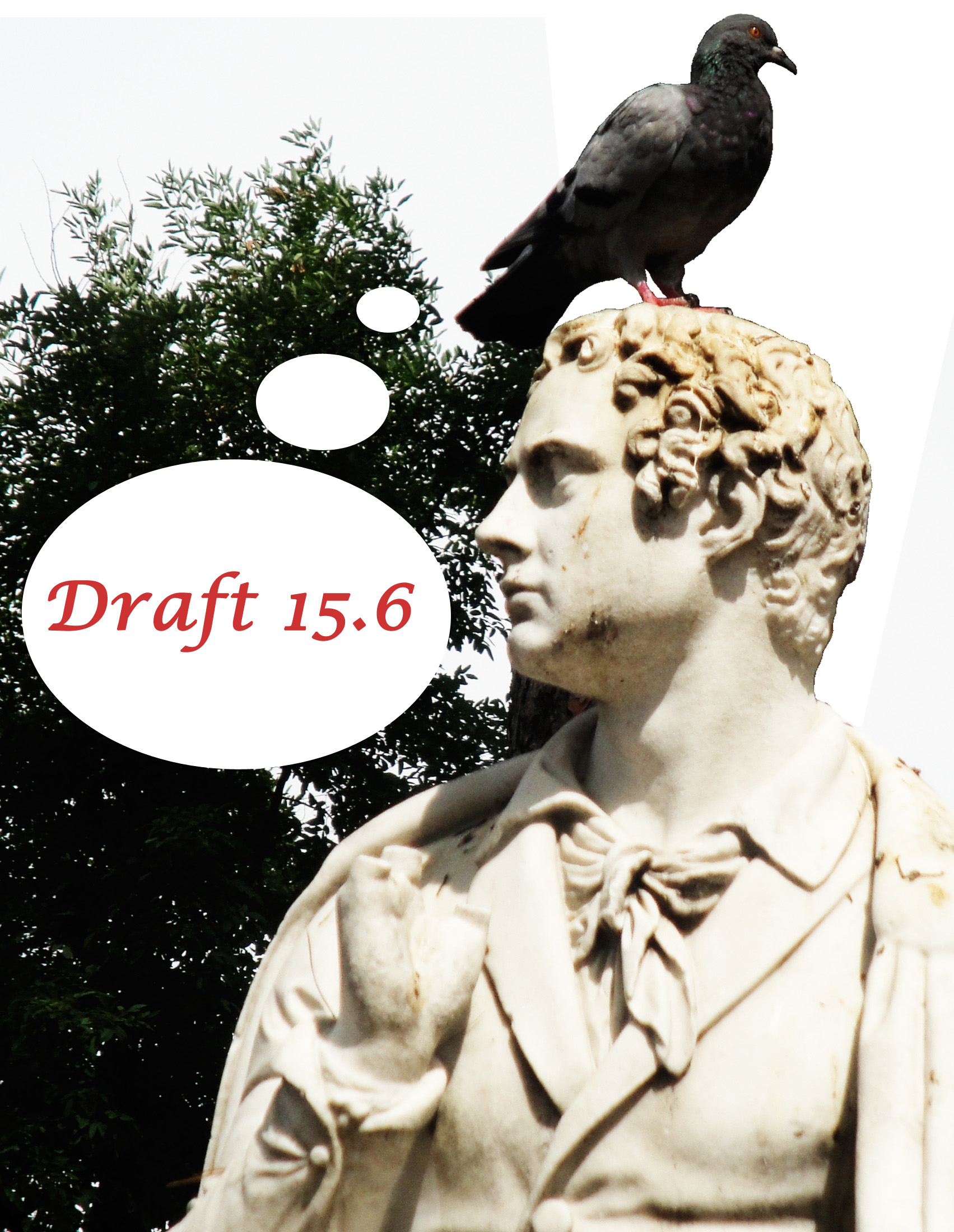
Image by Ron Edding
We’re excited to present our second virtual edition of the Draft reading series
Sunday, May 24, 2019
3:00 p.m.
We’ll be featuring new work by Gavin Barrett, Adebe DeRango-Adem, David Silverberg and Paul Vermeersch, along with brief readings by Carole Giangrande, Rita Shelton Deverell, Marcia Johnson, Ruth Panofsky and Elana Wolffand special guests from our beloved neighbourhood Councillor Paula Fletcher, Adam Barrett from East End Arts, and Hai Luke Tran from Hanoi 3 Seasons.
Please register here through Eventbrite:
https://www.eventbrite.ca/e/draft-156-tickets-104471936374
We welcome donations from those who are able to contribute. If not, please attend for free — you are most welcome!
The money will go straight to the brief readers, except for a small amount to cover the series costs. If you wish to send a donation, please send an e-transfer to draftseriescollective@gmail.com
Here’s some more information about our feature readers:
Gavin Barrett is a poet and creative entrepreneur. Gavin was born in Bombay (now Mumbai), of Anglo-Indian and Goan East African parentage. He has a Bachelor’s degree in Economics from St. Xavier’s College, Bombay and an M.A. in English Literature from Bombay University. After leaving Bombay, he lived in Hong Kong for several years before immigrating to Canada always making a living as a professional writer and creative entrepreneur. Gavin’s poetry has been published in Ranjit Hoskote’s anthology of 14 contemporary Indian poets, Reasons for Belonging (Viking/Penguin India); the journal of Pen India; The Folio; The Independent (Bombay); The Toronto Review of Contemporary Writing Abroad; and Poeisis – the journal of the Bombay Poetry Circle of which he was a founding member. He was a contributing writer to This|ability, a book on Canada’s art brut and outsider artists. Understan (Mawenzi House, to be released June 2020) is his first collection of poems. He is the founder, host and series co-curator of the Tartan Turban Secret Readings, a Toronto reading series that focuses on giving emerging visible minority writers a stage. He sits on the Advisory Board of the Canadian Authors Association – Toronto and is an associate member of The League of Canadian Poets. Gavin is also the co-founder of Barrett and Welsh. A certified B Corporation® based in Toronto, Barrett and Welsh specializes in diversity and inclusion communications and urban sustainable development branding and advertising.
Adebe DeRango-Adem is a writer and former attendee of the Jack Kerouac School of Disembodied Poetics (Naropa University), where she mentored with poets Anne Waldman and Amiri Baraka. She is the author of three full-length poetry books to date: Ex Nihilo (Frontenac House, 2010), Terra Incognita (Inanna Publications, 2015), and The Unmooring (Mansfield Press, 2018). A poem from The Unmooring was featured in the 2019 Poem-In-Your-Pocket anthology, co-created by the League of Canadian Poets and the Academy of American Poets. She served as the 2019-20 Barbara Smith Writer-in-Residence with Twelve Literary Arts, in Cleveland, Ohio.
David Silverberg is a poet, spoken word artist, solo performer and journalist. He has performed his poetry across Canada, and also in European cities such as Paris and London. His spoken word solo show Jewnique debuted in 2018 and he’s brought the show to Ottawa, Calgary and Blue Mountain Resort. His latest poetry collection As Close to the Edge Without Going Over (Kelp Queen Press) blends science fiction with magic realism to reflect David’s passion for fantastical fiction, with his writing mentors being the likes of Harlan Ellison, Salman Rushdie and Gunter Grass. David also founded Toronto Poetry Slam, one of Canada’s most popular poetry events. His non-fiction work has been published in The Washington Post, BBC News, The Globe & Mail, Vice, Business Insider, Broken Pencil Magazine and many more.
Paul Vermeersch is a poet, multimedia artist, creative writing professor, and literary editor. He is the author of several poetry collections, including the Trillium–award nominated The Reinvention of the Human Hand and, most recently, Self-Defence for the Brave and Happy. He holds an MFA in creative writing from the University of Guelph for which he received the Governor General’s Gold Medal. His poems have been translated into Polish, German, Spanish and French and have appeared in international anthologies. He teaches at Sheridan College and is the founding editor of Buckrider Books, an imprint of Wolsak and Wynn Publishers Ltd. Shared Universe: New and Selected Poems 1995-2020 will be published in September, 2020. He lives in Toronto.
We are grateful to the Canada Council through the League of Canadian Poets, as well as the Toronto Arts Council for this support of this reading.
How can I get copies of the Author’s books? Visit our Virtual Book Table!
Please support authors and bookstores if you can!
Carole Giangrande: Indigo Books, Amazon, Inanna Publications website.
Rita Shelton Deverell: A Different Booklist and on-line ordering platforms.
Marcia Johnson: Canadian Play Outlet run by Playwrights Guild of Canada.
Ruth Panofsk: Amazon; bookstores; inanna.ca
Elana Wolff : Libraries, bookstores, the Guernica Editions website, or through the author.
Also Draft Collective member, Jade Wallace has a new Chapbook: The Southern Ontario Gothic Tour
And in case you have not heard … the fine and incredibly hard-working folks at Queen Books are doing home delivery these days.
Draft April 26th 2020 … is ON(line)
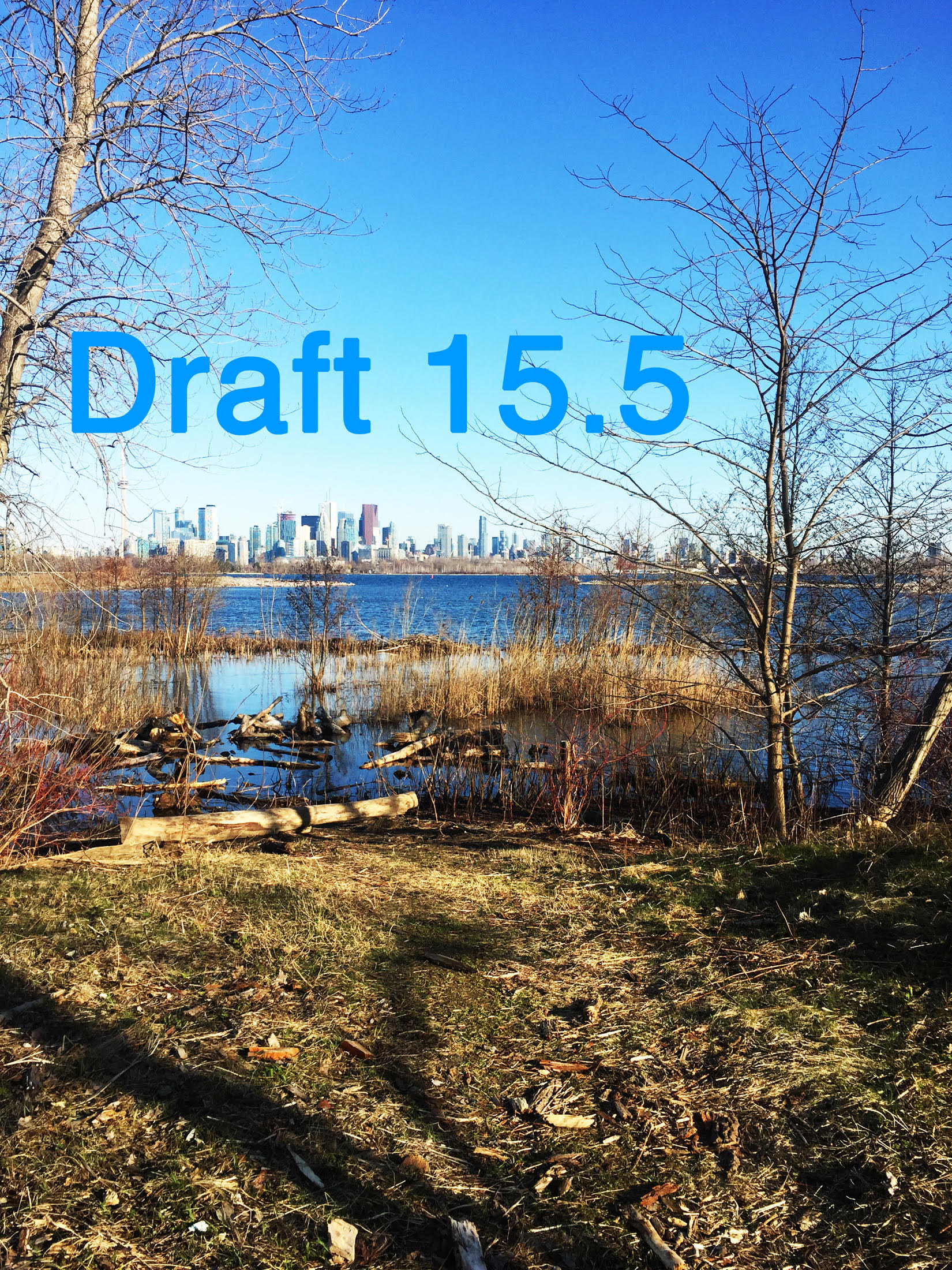
Please join us for our first virtual edition of Draft. April 26 at 3:00 p.m.
YOU MUST REGISTER on Eventbrite here to receive a link to the reading. It’s free!
We’ll be featuring new and unpublished work by Djamila Ibrahim and Lynne Kutsukake, and brief readings by Ronna Bloom, Sandra Campbell, Kern Carter, Margaret Code, Kate Marshall Flaherty, Jenn Forgie, Jordan Hall, Melanie Margel, Diana Manole, Susana Molinolo, Priya Ramsingh, Rebecca Rosenblum, Rami Schandall, Kit Varnam and
thom vernon.
HOW CAN I GET COPIES OF THEIR BOOKS?
Some of the authors have provided us with links to where their books are available. Please support authors and bookstores if you can!
Kate Marshall Flaherty
https://www.inanna.ca/product/radiant/
Jordan Hall
https://www.concordtheatricals.com/a/319/jordan-hall
Djamila Ibrahim
https://houseofanansi.com/search?q=ibrahim
House of Anansi has a wonderful promotion that allows you to give the same e-book to a friend with every purchase of one of their e-books.
Lynne Kutsukake
https://www.penguinrandomhouse.com/books/241812/the-translation-of-love-by-lynne-kutsukake/
Rebecca Rosenblum … most independent bookstores, as well as Indigo
https://www.chapters.indigo.ca/en-ca/home/search/?keywords=Rebecca%20rosenblum#internal=1
Here is some more information about the featured readers:
Djamila Ibrahim‘s debut short story collection Things Are Good Now was shortlisted for the Danuta Gleed Literary Award. Djamila’s stories have been shortlisted for the University of Toronto’s Penguin Random House Canada Student Award for Fiction and Briarpatch Magazine’s creative writing contest. Things Are Good Now was one of Now Magazine’s 10 Books To Be Excited About in 2018 and has made several CBC lists of Books/Writers To Watch For as well as being reviewed favourably in many other publications. The Globe and Mail has called Things Are Good Now “[an] essential fiction for right now.” Djamila was formerly a senior advisor for Immigration, Refugees and Citizenship Canada. She now lives and works in Toronto.
Lynne Kutsukake is a Japanese Canadian writer. Her short fiction has appeared in The Dalhousie Review, Grain, Windsor Review, Ricepaper and Prairie Fire. Her debut novel, The Translation of Love, won the Canada-Japan Literary Award (2016) and the Kobo Emerging Writers Prize for Literary Fiction (2017).
Acknowledgments:
Cover image by Ron Edding
We are grateful for the financial assistance of the Toronto Arts Council and the Canada Council for the Arts through the Writers’ Union of Canada.
Introducing the Dock: Toronto’s Newest Artist-Run Cafe
A conversation with Mimi O’Bonsawin, artist/teacher/proud owner of the Dock, Draft’s newest venue.
When I walked into the Dock, my first impression was of a cafe tucked between a kayak shop and tourist “trading post” somewhere in Huntsville. Looking back outside, a crane loomed over, ready to throw up Toronto’s latest condo tower over a neighbourhood steeped in family-friendly quaintness.
Mimi O’Bonsawin was standing by the counter, chatting with a barista. She’s a slight lady, steeped under dreadlocks, with owlishly round glasses that looked like she inherited them from a librarian. As an indie singer-songwriter as well as the proprietress of Draft’s newest venue. I asked her about her music passions and her newest venture.
Answers have been condensed and changed for clarity.
I listened to your most recent album, and it has a distinct style, unique from other indie singer-songwriters. What is your music’s biggest influence?
I listen to a lot of different artists. But in my music, I am the same person when I write music and in everyday life. Some people have a different persona when they perform, but I keep it real. I like that, I keep it real.
Who is your most-admired artist?
I have a couple of influences. Bob Marley is one and the other is Buffy Sainte-Marie. She’s a first-nations woman from Saskatchewan, who’s been around since the 60s. She’s written amazing songs for Elvis, Janice Joplin to Joe Cocker. They all covered her songs, the list goes on. She’s still touring around the world at 74 and she’s amazing. She’s definitely my idol and I would love to have a career like hers.
What’s your favourite poem or piece of music?
“Oppression” by Ben Harper, is a good song, based on what’s happening in the world. It’s written like a poem and the way he sings it is like a spoken-word. It’s pretty cool.
So why did you choose to become a musician?
I’ve always been a musician. Even before I could talk I would sing and dance and put on concerts for my family. My parents always knew that I was going to become a musician since I was 1 or 2. I started taking music seriously when I was in highschool, and I just kinda went from there.
You chose to become a musician but you are also a workshop instructor. What can you tell me about your workshop “Rhythm & Rhyme”?
I do some songwriting workshops across Ontario, southern Ontario and northern Ontario, for kids grades 4 – 12. And I do songwriting and empowerment through storytelling and song creation. It’s pretty fun.
Then you moved onto being the proprietress of The Dock…..
Yeah, my dad and I and my cousin had the opportunity to open up this coffee shop. My cousin is also a singer as well as a dancer and actor. And so when we were building this place, it was very important to have it a space for artists. We want it to have music and dance and poetry nights. We have local artists put their work on the wall and now we have a reading night. So it’s kind of a different space from a regular coffee shop because it’s very artist-driven you know? Our coffee is local from where we’re from, which is Northern Ontario, so it’s very important to keep it local in Toronto.
The Dock has a rustic atmosphere. Who designed the space?
We designed and renovated it ourselves. We’re from northern Ontario, so we brought the North Ontario vibe. I’m from Sudbury, so we brought a little piece of home to Toronto. All the wood (she taps on the table between us, it’s covered in coffee mug burns) is from just outside of Sudbury. Except for our [kitchen] equipment, everything is repurposed and reused and recycled.
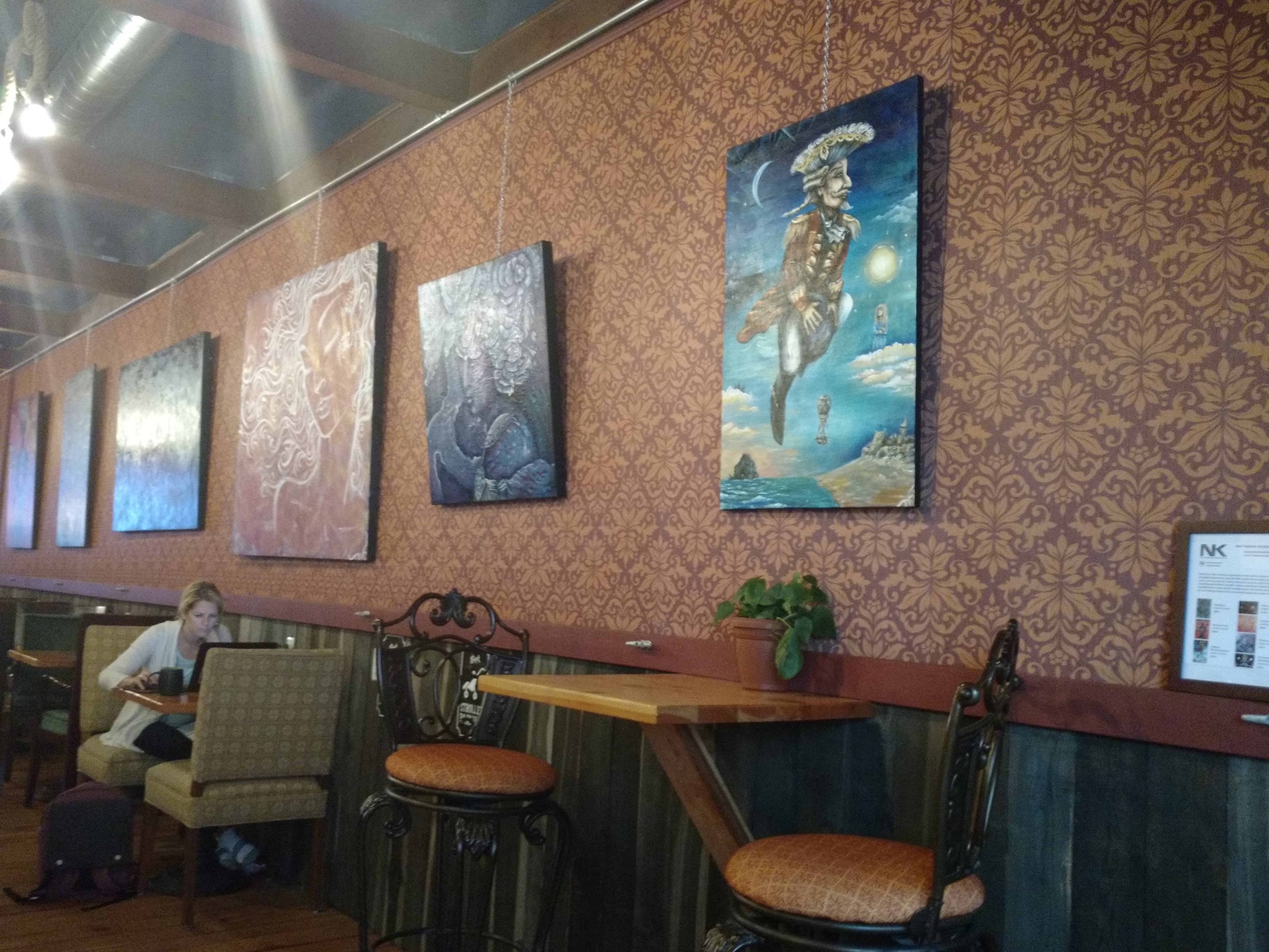
Nice, so what is your favourite drink at the Dock?
Well because it’s summertime we have our specialty, the Coconut Dream. It’s a coconut flavoured ice latte. It’s really popular. But we make all the drinks the traditional way. Our cappuccinos, our lattes are made in the proper way of making coffee. We take a lot of pride in our coffee.
And why open a cafe in Leslieville?
I used to live in Leslieville. And trying to perform in Toronto is a struggle. There’s a lot of places in the west-end for singer-songwriters to play but in the east-end, there’s nowhere to play. It all came together perfectly when we found this place. It was the perfect fit for coffee and music.
And do you hope the Dock will add colour to the neighbourhood’s persona?
Well, I think it’s going to enhance and give the community a different place to express itself. We want to encourage the arts and music, and I think that there is a need for that in Leslieville. To give people a voice.
Besides the Draft, do you hope to host more literary events?
We thought of doing a monthly poetry night, for different avenues. If anyone else comes to us we can be reached at our site or our Facebook page, We’re very flexible and open to different performances or gatherings or events. We’re going to be doing some fundraisers in here for an Indian dance crew, and different CD releases. I hope to do some art gallery nights. We are open to anything.
What is the future for you and the Dock?
For my music, I’m touring India in February, and going to Mexico in January. For the Dock, we’re here for the long-haul, and expand music more than the days we already have music, Thursday, Friday, and Saturday. We hope to get busier, host different events, and build from where we are. We’ve only been here for two months so we have a lot of room to grow and establish ourselves in this neighbourhood. We want to make a name for ourselves and have the community come in here and take part in it.
Awesome, thank you so much, Mimi
My pleasure 😉
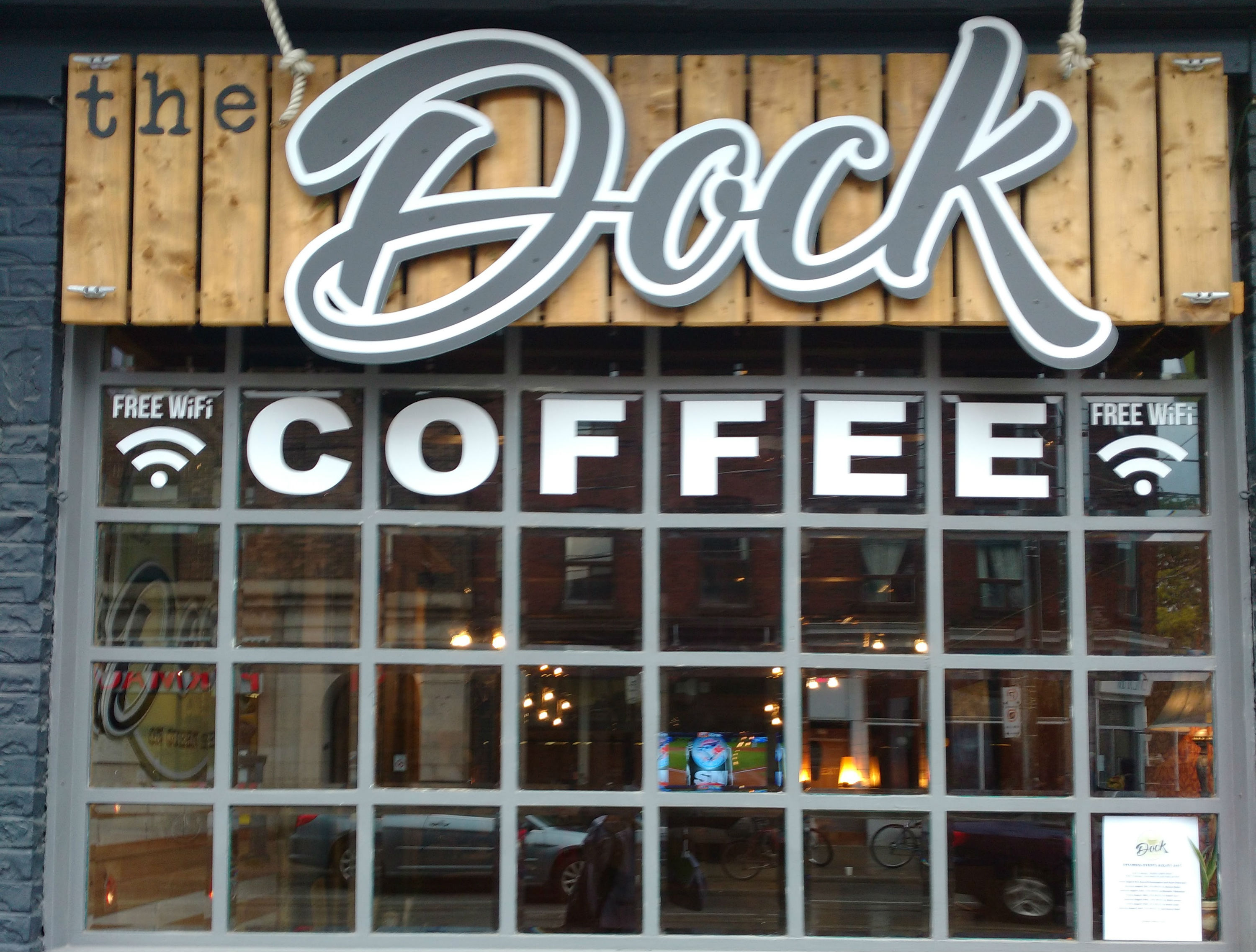
The Best Cultural Exchange That Can Happen: Part Three of an Interview with Bänoo Zan of Shab-e She’r
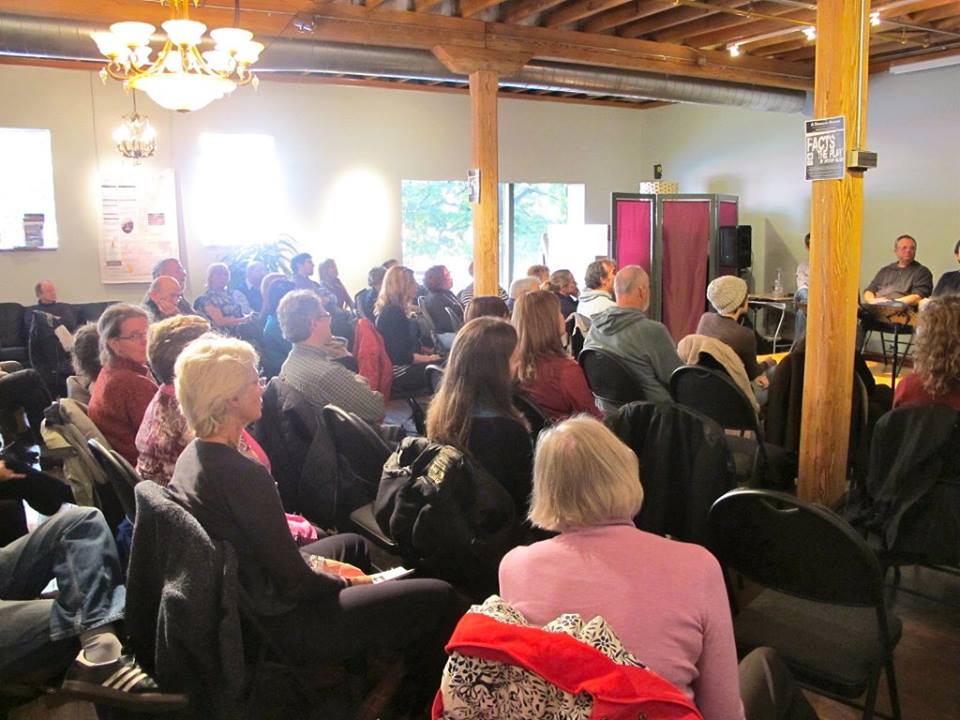 Bänoo Zan is the founder, artistic director, and host of Shab-e She’r, which has been described as “the most diverse poetry series and open–stage in Toronto.” Now four and a half years old, having begun in November 2012, the reading series holds events on the last Tuesday of every month, which currently take place in the Church of St. Stephen-in-the-Fields near College and Spadina. Zan graciously agreed to an interview with Draft Reading Series collective member Jade Wallace to talk about experiencing poetry in a language you don’t speak, the relationship between academia and the literary community she’s building, and government grants. Below is part three of a three-part interview.
Bänoo Zan is the founder, artistic director, and host of Shab-e She’r, which has been described as “the most diverse poetry series and open–stage in Toronto.” Now four and a half years old, having begun in November 2012, the reading series holds events on the last Tuesday of every month, which currently take place in the Church of St. Stephen-in-the-Fields near College and Spadina. Zan graciously agreed to an interview with Draft Reading Series collective member Jade Wallace to talk about experiencing poetry in a language you don’t speak, the relationship between academia and the literary community she’s building, and government grants. Below is part three of a three-part interview.
JW: Your reading series openly welcomes works in any language. I assume that often this means that you or some members of the audience are listening to poetry being read in a language you or they do not know. Are there emotional, intellectual, or physical differences between how you experience poetry written in a language you don’t know and poetry written in a language you do know?
BZ: Multiculturalism is respect for the way diverse cultures express themselves: in poetry the way is the language and even the accent. Though Toronto is one of the most diverse cities on the planet, I am not sure Torontonians realize the extent of linguistic alienation of newcomers.
Listening to poetry in another language highlights its musical and linguistic aspects. If the language you are listening to is of the same family as the one(s) you are familiar with, you listen more intently to pick up the odd word or expression you may know. You also listen with your pre-verbal ear. You listen with your heart. This increases your empathy and respect for people who do not have your command over the dominant language and yet are driven by the urge to share their feelings. It is the best cultural exchange that can happen.
JW: How do you think your background as a professor of literature and literary critic has shaped your approach to curating a poetry reading series? Do you carry over skills or interests from academia into your series?
BZ: Years of teaching at university level have given me self-confidence and social and leadership skills. My background has also helped me form and articulate my vision and not be swayed by those who have tried to highjack the event. It has given me the management skills I need to interact with team members, volunteers, audiences and featured poets. It has also allowed me to go beyond the academic approach. I have been encouraged to introduce pedantry, but I haven’t given in. I see my role at Shab-e She’r as the organizer and facilitator of an ongoing cultural exchange. I want to make sure it doesn’t become irrelevant, and I want to encourage participants to feel responsible for its success. Through exposing poets to practices outside their immediate circles, we hope to foster a movement in poetry that has the best of every practice and can be claimed by us all.
JW: You mentioned in a previous interview that you wouldn’t want to rely on government grants to keep the series afloat and prefer to rely on community support. Beyond the obvious fact that community support helps ensure that the series is serving a function deemed important by attendees, are there other benefits, for example political benefits, to being supported by a community rather than a government?
BZ: At Shab-e She’r we believe in community building and there won’t be one without poets bringing people together. After all, because we believe in socially and politically engaged poetry, it makes no sense to produce or showcase it in the absence of an audience.
There is a practical consideration as well: writing grants is a confusing and time-consuming responsibility. I think it is unfair and exploitative to expect that an immigrant such as myself should do even more unpaid work so that my fellow-poets are paid better. If the poets feel the need for grants, we invite them to volunteer their time and expertise. This is also in line with our goal of developing into a community whose members support others.
There are other considerations as well: I don’t know much about grants and may be wrong, but it seems to me that they have fixed structures. It seems that organizers are expected to restructure our events in order to meet the granting bodies’ expectations, instead of those organizations trying to help us realize our goals and visions.
To connect with Zan and get updates about future Shab-e She’r events, join Shab-e She’r (Poetry Night) Facebook group, like Shab-e She’r –Poetry Night page on Facebook, follow Bänoo and/or the group on Twitter: @BanooZan & @ShabeSherTO, or join Bänoo’s email list at rghrhino@gmail.com.

